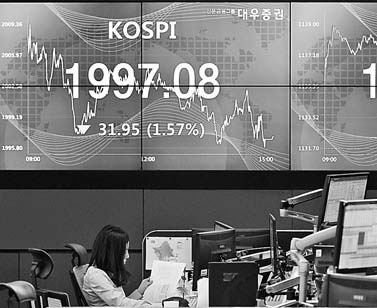Chinese equities up, other Asian markets down
|
A monitor displaying the Korea Composite Stock Price Index. While most Asian stock markets fell, the Shanghai Composite Index rose by 0.9 percent to 2,305.86, receiving a last hour boost on Chinese export data. SeongJoon Cho / Bloomberg |
Most Asian stocks slipped, with the region's benchmark falling for a fifth day, after the Bank of Japan didn't add to monetary stimulus.
But stocks on the Chinese mainland rose for the third time in four days after slowing growth in imports and exports fueled speculation the government will take steps to bolster the world's second-biggest economy.
The Shanghai Composite Index advanced 20.09 points, or 0.9 percent, to 2,305.86 at the close, reversing a loss of as much as 1.2 percent in the last hour of trading as some investors said measures may be introduced at Wednesday's regular meeting of the State Council. The CSI 300 Index added 1 percent to 2,519.79 today.
China Construction Bank Corp and Poly Real Estate Group Co climbed at least 1.5 percent, leading gains for lenders and property developers.
Sony Corp, which on Monday said it will cut 10,000 jobs, extended declines as the yen rose after the Bank of Japan's decision to leave its stimulus measures unchanged. BHP Billiton Ltd, Australia's biggest oil producer, dropped 0.6 percent after crude prices fell.
The MSCI Asia Pacific Index fell 0.3 percent to 123.82 at 5:14 pm in Tokyo. The MSCI Asia Pacific excluding Japan Index stocks slipped 0.6 percent as shares in Hong Kong and Australia fell following a four-day holiday during which the US reported slower jobs growth.
"Investors are still fearful that growth isn't strong enough and, if there isn't going to be more stimulus, then that's negative," said Shane Oliver, Sydney-based head of investment strategy at AMP Capital Investors Ltd, which has almost $100 billion under management. "There's also a less healthy element and that is that markets have become hooked on stimulus."
Slowing rally
The regional gauge has retreated 4 percent since the start of March as China cut its economic growth target and on speculation stocks had risen too fast after the index advanced 15 percent in the first two months of the year.
Stocks on the MSCI Asia Pacific Index are valued at an average of 1.4 times book value, compared with 2.3 times on the Standard & Poor's 500 Index and 1.4 for the Stoxx Europe 600 Index.
Futures on the S&P 500 added 0.1 percent. The gauge slid 1.1 percent in New York on Monday after a report last week showed US employers in March added the fewest jobs in five months.
Japan's Nikkei 225 Stock Average dropped 0.1 percent, reversing gains after the Bank of Japan meeting. Governor Masaaki Shirakawa and his colleagues left the central bank's 30-trillion-yen ($370 billion) asset-purchase fund and 35-trillion-yen credit-lending program unchanged.
'Calling for action'
"The market is calling for action from the BOJ," said Hiroaki Muto, a senior economist at Sumitomo Mitsui Asset Management Co in Tokyo, which manages about $123 billion. "The bank's policymakers might have reached a consensus to do something at the next meeting. Political pressure is backing them into a corner and will force them to act."
Hong Kong's Hang Seng Index dropped 1.2 percent, extending declines after China reported a trade surplus for March, damping speculation policymakers will cut lending curbs to spur growth. Exports rose 8.9 percent from a year earlier, more than the 7 percent gain predicted by economists.
Australia's S&P/ASX 200 dropped 0.6 percent, led lower by commodity producers and energy shares. South Korea's Kospi Index slipped 0.1 percent.
Sony plunged 3.5 percent to 1,586 yen, and the declines accelerated after the yen appreciated against the dollar, crimping the earnings outlook for Japanese exporters. The electronics maker's full-year loss will widen to 520 billion yen from the 220 billion yen projected two months ago, Sony said in a statement after markets closed.
Poly Real Estate, China's second-largest developer by market value, gained 3.3 percent to 11.66 yuan ($1.85) after contracted sales jumped 47 percent in March. China Vanke Co, the biggest, rose 2.4 percent to 8.42 yuan. China Merchants Property Development Co added 1.5 percent to 21.20 yuan.
"It's time to buy property developer shares," Dorris Chen, head of China research at BNP Paribas SA, said in an interview at Bloomberg's offices in Shanghai on Tuesday. "They are raising funds. There is a possibility the larger companies will acquire smaller developers."
BHP Billiton dropped 0.6 percent to A$34.25 ($35.22) in Sydney as oil traded near the lowest price in almost a week in New York on speculation US crude stockpiles rose to the highest level for this time of year since 1990.
Woodside Petroleum Ltd, Australia's second-biggest oil and gas producer, dropped 1.4 percent to A$34.69.
"Asia markets have been soft since the end of February, not breaking down but drifting lower," said AMP's Oliver. "We could be in for a rougher patch."
(China Daily 04/11/2012 page16)



















